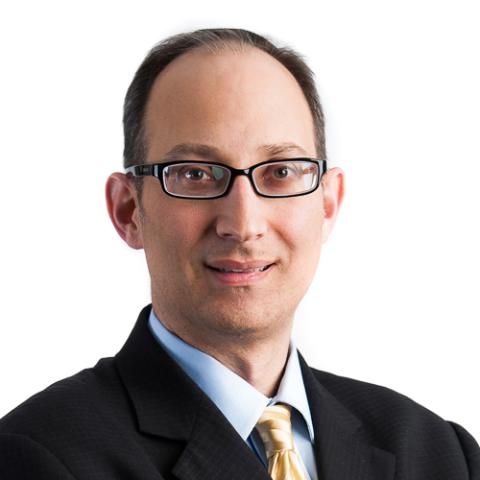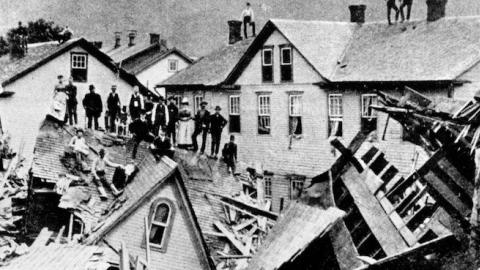Perhaps the most cheering aspect of our American democracy is the optimism meeting a new president and his administration. In two months, Donald Trump will move into the White House and bring with him a host of ideas and people to implement them in order to advance the interests of American citizens, and ensure the welfare, safety, and liberty of our families, friends, and neighbors. History has left us plenty of evidence, however, that fate has unpleasant surprises in store for new presidents, as well as those with a few years or even a full term under their belt.
How bad can it get? I spoke with Tevi Troy, former deputy secretary of the Department of Health and Human Services under President George W. Bush, and author of a just-published book on how the presidency has dealt with national catastrophes, Shall We Wake the President? Two Centuries of Disaster Management from the Oval Office.
**Lee Smith: How do you define a national catastrophe, or rather, how do you distinguish it from a tragic event?**
Tevi Troy: I address this question head-on in the book, writing that "To qualify as a true disaster, an incident must have scale and ripple effects. An incident must have an impact beyond one local area and have at least the potential to cause some kind of systemic breakdown." All kinds of bad things happen in the country all of the time, from pileups on the interstate to fires in apartment buildings. These kinds of things are tragedies, but they are not disasters that require presidential attention.
**LS: Given the nature and scale of political activity that follows school shootings, do these qualify as national disasters?**
TT: It's a good question, as technically mass shootings do not have ripple effects in that they are contained to the location where the incident happens. What I mean by ripple effects are disasters that have an impact outside of an immediate location, such as a disease that can spread, or a hurricane that cripples multiple states at once. But these terrible mass shootings, whether they are at a school or elsewhere, are happening with such a frequency that the ongoing phenomenon of them could be considered a disaster that requires presidential attention. I do not cover it as such in Shall We Wake the President?, but it might be worth looking at the problem in a future edition.
LS: What is the worst man-made disaster America has suffered? The worst natural disaster?
TT: The worst man-made disaster in American history is without a doubt the 9/11 terror attacks. Almost 3,000 Americans died, the air traffic system shut down, and our most important city was paralyzed. In the aftermath, we had to completely rethink our approach to protecting the homeland, redo our airport security systems, and spend billions in the process.
As for natural disasters, the worst one was the 1889 Johnstown flood. It killed over 2,000 Americans, and wiped out an entire town. Interestingly, President Benjamin Harrison was notified about the flood by telegraph and his response made clear that he believed that responding to weather disasters was a gubernatorial responsibility: "If the governor and your State Board of Health make any call upon me in any matter in my discretion I will gladly respond." The town elders of Johnstown did not denounce him for this response, which is what would have happened today, but instead they thanked him, telegraphing, "Your very satisfactory telegram received. We thought it proper to communicate with you in view of national government relation to water highways. We thank you." It was a very different time.
**LS: Was it right to blame George W. Bush for Katrina? Or how much can the federal government be expected to solve local crises, and how much is the responsibility of state and municipal authorities?**
TT: President Bush gets a raw deal regarding Katrina, but he is not blameless. The administration was slow to recognize the magnitude of the crisis and the now-legendary photo of Bush flying over the affected area was an unforced error. That said, the performance of the state and local officials was both worse and more responsible for what happened. The delays in evacuating the city, in particular, were incredibly damaging. And the two officials in charge at the state and local level—Governor Kathleen Blanco and New Orleans mayor Ray Nagin—were clearly out of their depth. As I often point out, Nagin was later sentenced to 10 years in prison for corruption while in office.
**LS: What are the disasters we've overreacted to? Did the Bush administration, for whom you worked, overreact to 9/11?**
TT: I don't think that the U.S. overreacted to 9/11. There was clearly a massive failure in the system, and we needed to correct for it. This does not mean that we did everything right after 9/11 or that I agree with every policy, but it definitely required a serious rethinking of our approach to security, intelligence, and terror in general. In terms of overreactions, one of the points I make in the book is that we devote too much presidential attention to weather-based disasters. I argue that presidents should spend more time on issues of national significance, such as preventing bioterror attacks, rather than dealing with localized weather events, even if they are deadly.
**LS: Was the Ebola threat overstated, or was the Obama administration just very adept in dealing with it?**
TT: The Ebola threat was overstated in that modern medical systems know how to manage diseases like Ebola and keep them from spiraling out of control. It was not overstated in that we never should have had as many cases as we had in the U.S. There were failures in thinking and execution that allowed the infection to spread beyond where it should have. As for the Obama administration, it seemed flummoxed initially, but eventually got things under control. One worry I had is that we had known about Ebola for decades, and even had a promising vaccine trial for monkeys in 2001, but when the outbreak hit in 2014, there was still no available Ebola vaccine for humans.
**LS: Are there threats you think are overstated, like for instance an electromagnetic pulse sending America back to the Stone Age?**
TT: I think the threat of a lone hacker or group of hackers taking down the power grid is just not realistic. It may make for exciting Hollywood movies, but it is not based in reality. That said, we are incredibly reliant on computerized networks. If all computers were to have disappeared in 1970, it would have had little impact on the day-to-day lives of the average American. If all computers were to crash today, it would affect every aspect of our lives. So I would classify EMPs and other forms of crashing the grid as low probability, but potentially high impact, events.
**LS: What threats don't we take seriously enough? What about a foreign government crashing our cybersecurity and hitting banks and other records?**
TT: The problem with the idea of foreign governments crashing our whole system is that to do so is a declaration of war against us, with all of the attendant consequences. Anyone who wants to engage in such an action is taking a huge risk of a massive cyber and kinetic counterattack. This doesn't mean that it won't happen. Anyone who starts a war typically thinks they have an opportunity to win it. But they should also recognize that such an action would indeed entail a war.
LS: What are the threats the Trump administration should be thinking about?
TT: The biggest known threat we face is that of a massive economic collapse based on our unsustainable $20 trillion debt. This is not going to happen today, tomorrow, or next year, but it is a very real danger at some undetermined point in the future. The good news is that it is addressable with some smart long-term policy thinking. The bad news is that we have not yet shown a willingness as a society to engage in that thinking.
**LS: What are the threats no one is thinking about—or as Donald Rumsfeld put it, what are the unknown unknowns?**
TT: I worry about a terrorist group getting hold of the capability to develop and distribute some kind of deadly bioagent. There are technical hurdles to both the development and the distribution side that prevent them from doing so at this point, but they certainly have the desire to do so, and they are working on the capability. The real problem is that having the capability to develop is different than just acquiring weapons. Once you have the capacity to develop a deadly agent you can continually deploy it, which makes this the threat I worry about the most: not a one-off biological attack, but an ongoing campaign of biological attacks that would have to be cut off at the source.



















